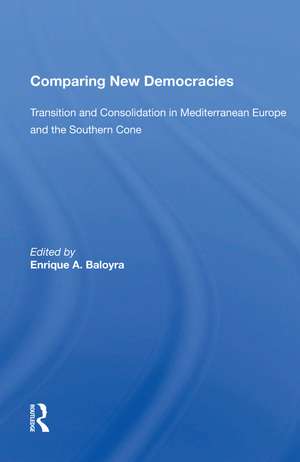Comparing New Democracies: Transition And Consolidation In Mediterranean Europe And The Southern Cone
Editat de Enrique A. Baloyraen Limba Engleză Hardback – 23 mai 2019
| Toate formatele și edițiile | Preț | Express |
|---|---|---|
| Paperback (1) | 263.36 lei 6-8 săpt. | |
| Taylor & Francis – 23 noi 2020 | 263.36 lei 6-8 săpt. | |
| Hardback (1) | 766.65 lei 6-8 săpt. | |
| Taylor & Francis – 23 mai 2019 | 766.65 lei 6-8 săpt. |
Preț: 766.65 lei
Preț vechi: 1028.85 lei
-25% Nou
Puncte Express: 1150
Preț estimativ în valută:
146.71€ • 152.24$ • 122.63£
146.71€ • 152.24$ • 122.63£
Carte tipărită la comandă
Livrare economică 18 martie-01 aprilie
Preluare comenzi: 021 569.72.76
Specificații
ISBN-13: 9780367006648
ISBN-10: 0367006642
Pagini: 336
Dimensiuni: 149 x 229 mm
Greutate: 0.59 kg
Ediția:1
Editura: Taylor & Francis
Colecția Routledge
Locul publicării:Oxford, United Kingdom
ISBN-10: 0367006642
Pagini: 336
Dimensiuni: 149 x 229 mm
Greutate: 0.59 kg
Ediția:1
Editura: Taylor & Francis
Colecția Routledge
Locul publicării:Oxford, United Kingdom
Cuprins
Introduction -- Theoretical and Comparative Perspectives -- Democratic Transition in Comparative Perspective -- Democratic Establishments: A Dimensional Analysis -- Mass and Elite Perspectives in the Process of Transition to Democracy -- South American Cases -- From Diarchy to Polyarchy: Prospects for Democracy in Chile -- Dilemmas of the Consolidation of Democracy in Argentina -- The Political Transition in Brazil: From Authoritarian Liberalization and Elite Conciliation to Democratization -- Political Parties and Elections in the Process of Transition in Uruguay -- on Governability -- Argentina: Political Transition and Institutional Weakness in Comparative Perspective -- Conclusion: Toward a Framework for the Study of Democratic Consolidation
Descriere
The transition to democracy has been a significant trend in Mediterranean Europe and Latin America during the last ten years. This book presents comparative analyses that offer a theoretical synthesis of the dynamics of recent democratization processes on both sides of the Atlantic. The contributors argue that transition is a response to fundamentally political factors. They describe how dictatorships deteriorate and collapse, how key events in the early stages of transition may encourage the military to withdraw from politics, and what the requirements are for a democratic outcome. The second part of the book focuses on the specific processes of transition and consolidation occurring in Argentina, Brazil, and Uruguay. Finally, a crucial dilemma of democratic consolidation—the issue of govemability— is examined within the framework of the relationship between social structure and political institutionalization.
